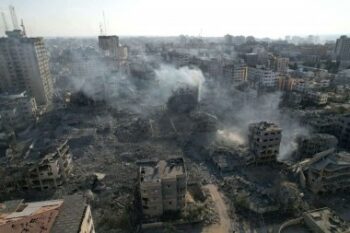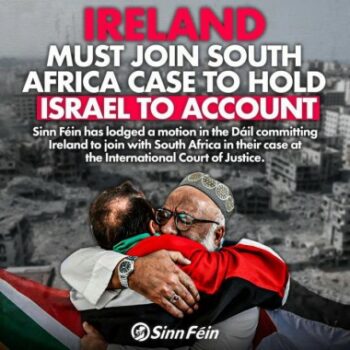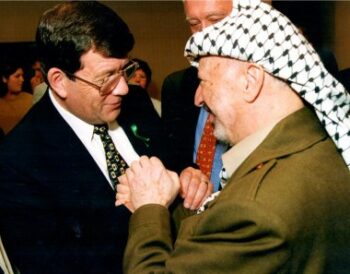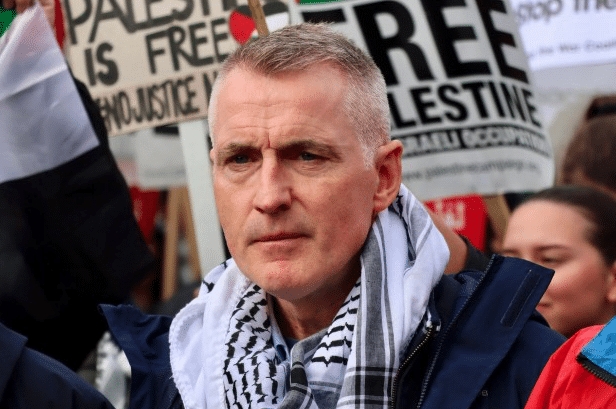 Israel’s war in Gaza has now entered its fifth month.
Israel’s war in Gaza has now entered its fifth month.
During this week 52 states and three international organisations have engaged directly with the International Court of Justice (ICJ) on the illegality of Israel’s occupation of Palestine. Their actions are without parallel and follow South Africa’s unprecedented legal action against Israel due to its genocidal war in Gaza.
26 member states of the EU and 13 members of the UN Security Council are now calling for an immediate ceasefire.
This is not a war of defence.
It is being executed as a war of ethnic cleansing against the Palestinian people, not only in Gaza, but across the West Bank.
A war of genocide which has been broadcast and recorded in real time by the victims of that same genocide.
Gaza is now a graveyard for children.
A cemetery for international law.
It will forever be remembered as the place when so-called western democracies acted in complicity with an attempt to annihilate the Palestinian people, their society, and culture.
Gaza and the West Bank; and the occupation of Palestine is the most defining moral and humanitarian issue of our time.
The daily atrocities, massacres and carnage are mind numbing and soul destroying.
From a population of 2.3 million in the Gaza strip, more than 37,000 Palestinians are now confirmed dead, or lost in the rubble.
Over 70,000 people have been injured.
Thousands of others have been maimed for life.
Damaged limbs are being amputated without anesthetics because there are none.
It is clear that the Israeli onslaught is attempting to completely destroy all of Gaza’s hospital, medical and health care infrastructure in total violation of the rules of war. There is no other rational explanation for the invasions and destruction of Al-Shifa and Nasser hospitals.
The forced displacement of the Gaza Strip’s population means that 1.5 million people have been pushed into Rafah; a space normally home to just 250,000.
If the Israeli government proceeds with its threatened ground invasion into Rafah, the consequences will be apocalyptic.
At the same time, in the West Bank, 400 men and women, and dozens of children, have been executed by Israeli undercover death squads; ground forces; illegal settlers; and; missile and drone strikes.
Israel’s war is also being used to mask a massive upsurge of Palestinian home demolitions, land theft, illegal settlement expansion in the West Bank and Gaza.
Since 7 October, over 7000 residents of the West Bank, and 2,500 from Gaza, have been arrested and interned.
In reports emerging, which are reminiscent of British torture techniques in Ireland, these detainees are being subjected to physical torture, sensory deprivation, and systematic humiliation.
Ethnic cleansing and genocide is being implemented across Palestine by this Israeli government with total impunity.
There is no coming back from this.
The actions of the aggressors have crossed every conceivable legal, diplomatic and political boundary.
Israel’s war in Gaza screams a question for the international community; and at us all:
What side are we on?
The choice is between international law and humanity, or genocidal barbarity.
There are no grey areas.
All right minded people stand with the oppressed and dispossessed of Palestine:
With every sister, brother and child in Gaza, and the occupied West Bank.
We must not stop talking about Palestine.
We must be outraged by every atrocity being committed.
But the people of Palestine need more than that. Irish anger is not a political strategy.
Palestinians need our activism and our leverage. They expect Ireland to be their voice.
Palestinian leaders have made clear they want the combined political and civic pressure of Ireland to be used at home, and internationally on their behalf.
Our responsibility to the Palestinian people must be to build a global anti-apartheid movement with the momentum of the campaign which helped end the horror of apartheid in South Africa.
That can only be done by creating and maintaining maximum unity across Irish society.
The absolute focus must be on securing a permanent, unconditional ceasefire: A withdrawal of all Israeli forces from both Gaza and the West Bank: And, an end to the human suffering of every Palestinian by using every form of influence.
These priorities should take primacy over all domestic political differences.
In July 1984, the decision of two young Dublin trade unionists by refusing to handle South African fruit became the catalyst for the iconic Dunnes Stores Strike.
The strike maintained by Mary Manning and Karen Gearon, and eight other workers, for two years and nine months, eventually changed Irish government policy towards the South Africa apartheid regime.
This example can be repeated by every individual Irish person today.
We can refuse to do business with companies which invest in, or profit from, Israeli state apartheid in Palestine.
We should withdraw our own business from those who profit from apartheid practices, and the occupation in Palestine.
 Across Ireland, Sinn Féin is now introducing motions in councils which will require the compliance with ethical investment and purchasing practices.
Across Ireland, Sinn Féin is now introducing motions in councils which will require the compliance with ethical investment and purchasing practices.
In Dáil Éireann our party has called on the Irish government to join South Africa’s legal case against Israeli genocide at the ICJ.
In a failure of leadership, the government parties refused to do so.
That was the wrong decision.
The Irish state should change its position and do much more.
Without further equivocation it should listen to the leaders of the Palestinian struggle, and immediately recognise the state of Palestine.
Every single opportunity must be used demand an end to Israel’s genocidal war and occupation of Palestinian.
Following restoration of power sharing in the north, Uachtarán Shinn Féin Mary Lou McDonald directly challenged British Prime Minister Rishi Sunak over his government’s support for Israel’s war.
Last weekend Michelle O’Neill urged U.S. Secretary of State Antony Blinken to support a ceasefire position.
In recent days I have called on both the EU and U.S. Ambassadors to Britain to intervene and demand that Israel’s aggression in both Gaza and the West Bank is ended immediately.
While Sinn Féin promotes the case for Irish unity, and support for the peace process abroad, we will be a voice for Palestine.
We will seize every political and diplomatic opportunity to call for an end to the genocide and ethnic cleansing, and demand an end to the war, and occupation of Palestine.
This March we will use the access created in Washington, through promotion of our peace process, with White House, State Department National Security officials, and on Capitol Hill, to demand an end to Israel’s war and promote Palestinian national freedom.
Sinn Féin has told the political and civic leaderships across the full spectrum of the Palestinian struggle, that we will categorically do so.
We will not hold back from using all available leverage on behalf of our Palestinian sisters and brothers.
And the Irish government, and all Irish politicians who travel abroad this St Patrick’s Day period, should do the same.
Whether at home or abroad, all Irish influence must be mobilised on behalf of Palestine.
 We must ensure the plight of the Palestinian people is spoken of and heard everywhere.
We must ensure the plight of the Palestinian people is spoken of and heard everywhere.
Ireland must refuse to stop talking about Palestine.
Irish republicans are proud of our history in struggle with the Palestine Liberation Organisation and the Palestinian people.
The bonds between our national struggles have existed for many decades and they are unbreakable.
While we are closer now than at any time in history to the achievement of Irish self-determination and independence, Sinn Féin believes that our own freedom will ultimately be incomplete without the freedom of the Palestinians.
This new phase of Israel’s intensified occupation and aggression has placed renewed global focus upon Palestinian sovereignty and statehood; the right of Palestinian people to return to their homeland; and, the imperative of releasing all political prisoners.
This is a watershed moment. The future of Palestine demands that the democratic world finally acts decisively in support of the Palestinian people’s fundamental, national and human rights.

